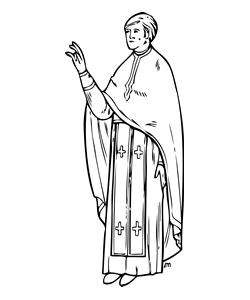|
|||
|---|---|---|---|
| This weekly bulletin insert complements the curriculum published by the Department of Christian Education of the Orthodox Church in America. This and many other Christian Education resources are available at http://dce.oca.org. | |||

A group of saints, all Roman soldiers, were martyred together in about the year 302 in Macedonia. Their names are Pasicrates, Valentin, and Julius (with other companions) and the details of their stories are somewhat diverse. Pasicrates' brother had renounced Christ for fear of persecution, and he tried to convince Pasicrates to do the same. But Pasicrates angrily told him, "Get away; you are no brother of mine!" Then he and Valentin submitted to death together. Julius had served in the army for many years, and made a statement at his trial: "I served the emperor faithfully for 26 years. Shall I now fail to be faithful to the greater Kingdom and its King?" He too was executed. One of the companions, Marcian, had a wife and young son. As he was preparing to face death, his wife came to the place of execution, carrying the child in her arms. Marcian kissed his son and prayed that God would take care of him. He commended his young child to God's care. The word "commend" occurs in our worship services, especially the Divine Liturgy. In the Litany of Supplication the priest says, "...let us commend ourselves and each other and all our life to Christ our God." The Prayer of Preparation contains these words" "Unto Thee we commend our whole life and hope, O Master who lovest mankind." The meaning of "commend" is important. It expresses a basic tenet of our faith--that we trust God to care for us, to take care of "all our life" and of each other. Commending ourselves to God means placing ourselves, so to speak, in His hands. We acknowledge that on our own we can't do anything; it is all up to Him and we are confident in entrusting ourselves to Him. In some liturgical translations, the word "commit" is used in place of "commend." But this completely changes the meaning of the petition. To commit means to pledge or to bind. When we commit ourselves or someone else, we put them under an obligation. How can we pledge, bind, or put under obligation to God people we may not even know? How can we commit people to Him who may not even believe in Him? We can't do any of those things. What we can do is put them under His care. So, for example, we "commend" to Him people we do not know personally but who we know are suffering in distant places. We commend to Him those we know and love, but for whom we have no personal power to do anything. The martyr Marcian was about to die and would no longer be able to care for and protect His child. But he could commend the boy to the One whose care is unfailing and unshakable. So as believers we commend "our whole life and hope" to God. We put ourselves, those we love, those we are worried about, those who suffer, in His hands. What better place is there to be? |
|||
